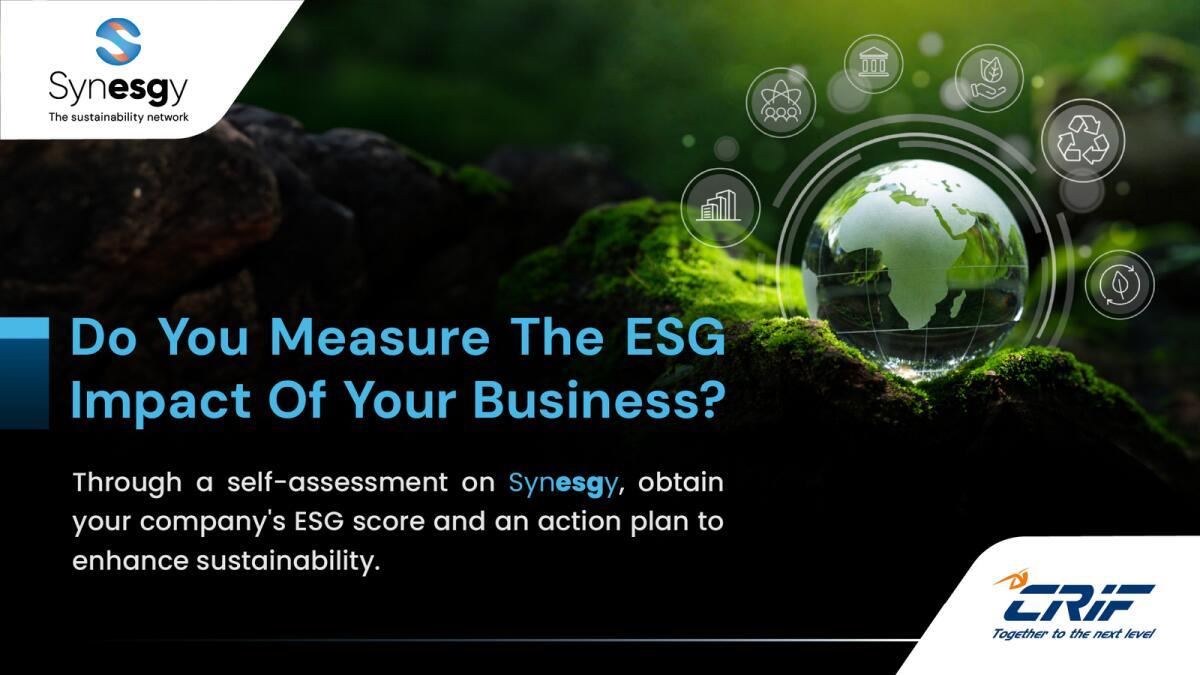
ESG Reporting: Key To Long-Term Corporate Resilience And Sustainability
ESG reporting enables companies to communicate their achievements and progress in ESG initiatives. This, in turn, equips investors, customers, and other stakeholders with the necessary information to make informed decisions. Companies that report about their social and environmental responsibility efforts are more transparent about how their activities impact the environment and those around them. Companies are better able to recognise and manage potential risks associated with environmental, social, and governance issues.
Manjeet Chhabra, Managing Director - CRIF Gulf
"Focusing on ESG considerations is crucial for the leadership team of organizations in order to demonstrate their commitment to ethical business practices and social responsibility. This enhances the company's standing among customers, employees, and the public. ESG is not a cost; it's an investment in the resilience and longevity of your business", said Manjeet Chhabra, Managing Director of CRIF Gulf.
ESG Reporting TrendsIn the European Union, publicly traded companies are mandated to report ESG information. While over 90 per cent of the largest companies worldwide report some ESG information, the challenge lies in the reliability and usefulness of this ESG information. Unlike financial reporting, which adheres to Global IFRS standards, ESG reporting lacks standardisation and comparability.
ESG reporting, although primarily voluntary, is increasingly becoming mandatory in the UAE. The government is setting new laws and adopting new international frameworks for sustainability. In 2020, the UAE Securities and Commodities Authority (SCA), the authority that regulates listed onshore companies in the UAE, issued a directive for public joint-stock companies to publish a sustainability report for every financial year. This requirement directed publicly traded companies listed on the Abu Dhabi Securities Exchange (ADX) to publish their sustainability reports. Such a development reflects the rising consciousness as well as the awakening towards environmental and social responsibility in the UAE.
Future of ESG ReportingTechnological innovation is driving more robust ESG reporting and disclosures through automated data collection, in-depth monitoring, and real-time analysis. Specific software such as SynESGy can collect, analyse, report, and publish ESG data, extending an opportunity for organisations to collect and report about their environmental and corporate social responsibility. There's also a significant push towards establishing a global system for ESG reporting to enhance its quality and comparability. As ESG reporting continues to evolve, the necessity for verification becomes paramount, ensuring the information's accuracy and reliability. Policymakers are exploring new avenues for ESG legislation, mandating organisations and private sector players to integrate sustainability into their routine practices and operations, including sourcing and supply.
How can organisations prepare for ESG Reporting?Firstly, organisations can assess their current state with regards to ESG. This requires a full screening of their organisational activities, including supply, sourcing, etc., to examine whether they're in line with ESG benchmarks. In addition, organisations can identify priority areas of ESG reporting, such as greenhouse gas emissions, energy usage, and resource efficiency, to respond to new concerns regarding ESG reporting. Most importantly, organisations must establish internal processes for collecting, reporting, and publishing ESG data. Internal processes include assigning individuals roles and responsibilities, setting aside resources, drafting new policies, and creating new internal controls for ESG data collection and reporting. Further, organisations can engage with internal and external stakeholders to understand their ESG priorities and expectations.
A good starting point would be to take a self-assessment to evaluate your company's ESG performance; please click here to take the assessment and receive an ESG score, an action plan, and a certificate of completion.
Visit our website to discover how SynESGy platform can enable your company to collect and report ESG data through a streamlined process.

Legal Disclaimer:
MENAFN provides the information “as is” without warranty of any kind. We do not accept any responsibility or liability for the accuracy, content, images, videos, licenses, completeness, legality, or reliability of the information contained in this article. If you have any complaints or copyright issues related to this article, kindly contact the provider above.
Most popular stories
Market Research

- Manuka Honey Market Report 2024, Industry Growth, Size, Share, Top Compan...
- Modular Kitchen Market 2024, Industry Growth, Share, Size, Key Players An...
- Acrylamide Production Cost Analysis Report: A Comprehensive Assessment Of...
- Fish Sauce Market 2024, Industry Trends, Growth, Demand And Analysis Repo...
- Australia Foreign Exchange Market Size, Growth, Industry Demand And Forec...
- Cold Pressed Oil Market Trends 2024, Leading Companies Share, Size And Fo...
- Pasta Sauce Market 2024, Industry Growth, Share, Size, Key Players Analys...





















Comments
No comment